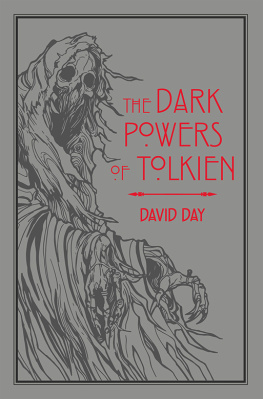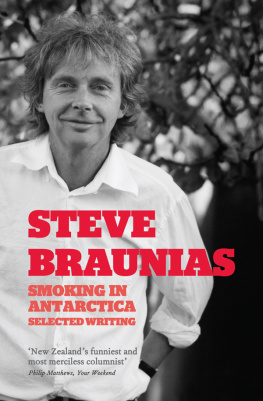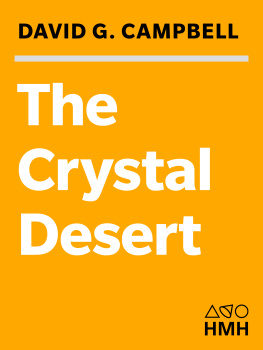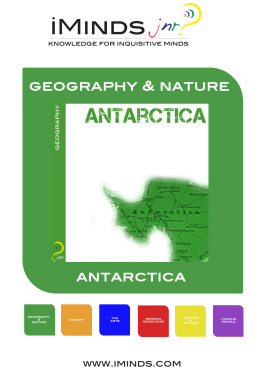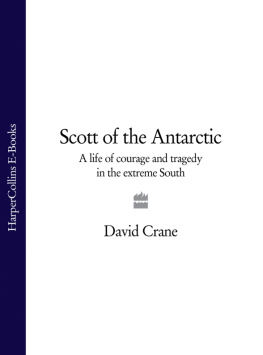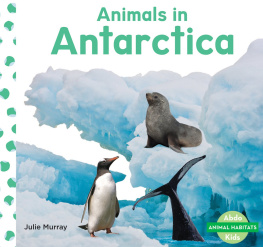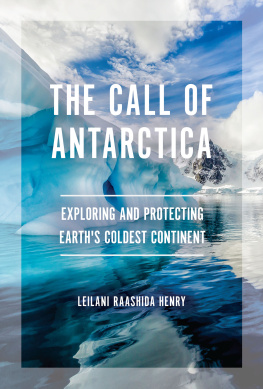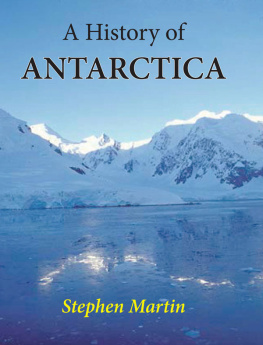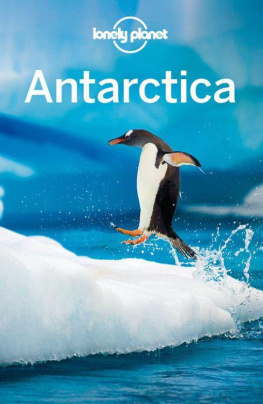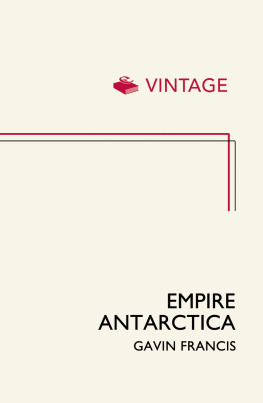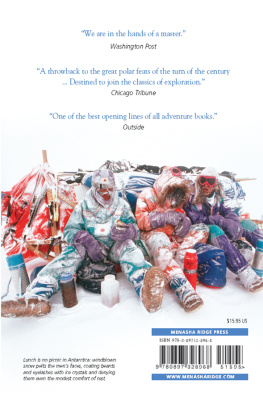Day David - Antarctica: A Biography
Here you can read online Day David - Antarctica: A Biography full text of the book (entire story) in english for free. Download pdf and epub, get meaning, cover and reviews about this ebook. year: 2012, publisher: Oxford University Press, genre: History. Description of the work, (preface) as well as reviews are available. Best literature library LitArk.com created for fans of good reading and offers a wide selection of genres:
Romance novel
Science fiction
Adventure
Detective
Science
History
Home and family
Prose
Art
Politics
Computer
Non-fiction
Religion
Business
Children
Humor
Choose a favorite category and find really read worthwhile books. Enjoy immersion in the world of imagination, feel the emotions of the characters or learn something new for yourself, make an fascinating discovery.

Antarctica: A Biography: summary, description and annotation
We offer to read an annotation, description, summary or preface (depends on what the author of the book "Antarctica: A Biography" wrote himself). If you haven't found the necessary information about the book — write in the comments, we will try to find it.
Antarctica: A Biography — read online for free the complete book (whole text) full work
Below is the text of the book, divided by pages. System saving the place of the last page read, allows you to conveniently read the book "Antarctica: A Biography" online for free, without having to search again every time where you left off. Put a bookmark, and you can go to the page where you finished reading at any time.
Font size:
Interval:
Bookmark:
A BIOGRAPHY
DAVID DAY

A Knopf book
Published by Random House Australia Pty Ltd
Level 3, 100 Pacific Highway, North Sydney NSW 2060
www.randomhouse.com.au
First published by Knopf in 2012
Copyright David Day 2012
The moral right of the author has been asserted.
All rights reserved. No part of this book may be reproduced or transmitted by any person or entity, including internet search engines or retailers, in any form or by any means, electronic or mechanical, including photocopying (except under the statutory exceptions provisions of the Australian Copyright Act 1968), recording, scanning or by any information storage and retrieval system without the prior written permission of Random House Australia.
Addresses for companies within the Random House Group can be found at
www.randomhouse.com.au/offices
Every effort has been made to acknowledge and contact the copyright holders for permission to reproduce material contained in this book. Any copyright holders who have been inadvertently omitted from acknowledgements and credits should contact the publisher and omissions will be rectified in subsequent editions.
National Library of Australia
Cataloguing-in-Publication Entry
Day, David, 1949
Antarctica / David Day.
ISBN 978 1 74166 908 4 (hbk.)
Antarctica Discovery and exploration.
Antarctica History.
Antarctica International status
919.89
Endpaper maps courtesy of National Library of Australia Internal design and typesetting by Midland Typesetters, Australia Printed in Australia by Griffin Press, an accredited ISO AS/NZS 14001:2004 Environmental Management System printer
Random House Australia uses papers that are natural, renewable and recyclable products and made from wood grown in sustainable forests. The logging and manufacturing processes are expected to conform to the environmental regulations of the country of origin.
Like Captain James Cook, I have been slowly circling the Antarctic. While labouring on other books, the ice-covered continent kept looming into view like an alluring mirage, suggesting itself as a subject worthy of closer exploration. The chance to do so came after I completed Conquest: How societies overwhelm others (2008), which examined how so-called supplanting societies claim territories and make them their own over an extended period of time. It was a new way of looking at the history of the world.
That books opening chapter began with the claiming of the French Antarctic territory by Jules-Sbastien Dumont dUrville. Only the penguins were watching the French sailors as they clambered onto an offshore islet and raised their nations flag to claim the adjacent coastline. However, it is clear from their accounts that the officers confidently expected that the territory claimed by such customary means henceforth belonged to France. The story of dUrville drew me to Antarctica. How was it that this simple ceremony could lay claim to a large region of Antarctica without any French citizen visiting the place during the subsequent century? How did Britain and its dominions later claim about two-thirds of the continent, only to have their claim go largely unrecognised? How has Antarctica come to be a continent with many claimants and no owners? One question led to another, and a book about the claiming of Antarctica became much more than that.
The researching and writing of this book has been a long journey, and one that could not have been completed without the assistance of many individuals and institutions. My home institution, La Trobe University in Melbourne, provided some research money that helped fund travel to archives in Britain, the United States, Norway, Australia and New Zealand. The University of Aberdeen was most generous in its assistance, providing me with a visiting position and funding to visit archives elsewhere. I would particularly like to acknowledge the support of the then Principal of the University of Aberdeen, Professor Sir Duncan Rice, and Vice Principal, Professor Bryan MacGregor. Some of the ideas in this book were discussed at seminars in Aberdeen and Melbourne and I am grateful for the feedback from participants.
I began and ended the research at the Scott Polar Research Institute in Cambridge, where the library and archive staff were unfailingly helpful and where I was able to discuss Antarctic history with Bob Headland over a lunchtime pint or two. Many thanks are due to Hilary Shibata of SPRI for kindly providing access to her translated account of Shirases expedition prior to its publication.
Several wonderful weeks were spent in New York where Dorothea Sartain helped access the files of the Explorers Club and Mary Lynne Bird and Peter Lewis steered me towards many interesting records held by the American Geographical Society. Paul Chaplin of the Antarctic Heritage Trust was very generous with his time during a visit to Oslo, as was historian Susan Barr at the Directorate for Cultural Heritage. Jan Erik Ringstad provided valuable help at the Whaling Museum in Sandefjord, where the language barrier might otherwise have made research difficult.
In Hobart, Andie Smithies, librarian at the Australian Antarctic Division, guided me around its valuable collection. Laura Kissel, Polar Curator at the Byrd Polar Research Center in Columbus Ohio, cheerfully fielded many requests for files. In Washington, Claire Christian of the Antarctic and Southern Ocean Coalition, pointed me towards much that was relevant in the ASOC office, while Jim Barnes reflected on his years of advocacy on behalf of Antarctica.
Thanks are also due to the archivists and librarians at the Alexander Turnbull Library in Wellington, Archives New Zealand in Wellington and Christchurch, the National Archives of Australia in Canberra and Hobart, the National Archives in London, the National Archives and records Administration in Maryland, the Auckland War Memorial Museum, the Churchill Archives Centre in Cambridge, the Canterbury Museum in Christchurch, the National Library of Australia, the Dartmouth College Library in New Hampshire, the Library of Congress, the Royal Geographical Society in London, the Roosevelt Library in Hyde Park, the Smithsonian Institution Archives in Washington and the State Library of South Australia.
Once again, my literary agent in London, Andrew Lownie, found enthusiastic and supportive publishers when the book was little more than an idea. At Random House, Meredith Curnow and Elena Gomez guided the manuscript through the press with patience and good humour, while my long distance editor, Julian Welch, working from Uppsala in Sweden, now knows more than he ever thought possible about the Antarctic.
Friends also helped lighten the load along the way Hkon Lie and Karen Mosman in Oslo, Claude and Irene Wischik in Aberdeen and Richard and Danielle Weiner in Providence. My children, Michael, Emily and Kelly, provided inspiration and stimulation in equal measure, while my wife, Tsila, was a constant presence on the journey and of immeasurable assistance with the research in countless archives. It is to Tsila that this book is lovingly dedicated.
David Day
La Trobe University
To Tsila
Farther than any man has gone before
1770s
Captain James Cook had the look of a disappointed man as he carried his charts and journals up the steps of the Admiralty building in London in August 1775. The son of a Yorkshire farm labourer, he had become one of the worlds great explorers. Yet he had failed to fulfil the great quest of the eighteenth century.
Font size:
Interval:
Bookmark:
Similar books «Antarctica: A Biography»
Look at similar books to Antarctica: A Biography. We have selected literature similar in name and meaning in the hope of providing readers with more options to find new, interesting, not yet read works.
Discussion, reviews of the book Antarctica: A Biography and just readers' own opinions. Leave your comments, write what you think about the work, its meaning or the main characters. Specify what exactly you liked and what you didn't like, and why you think so.

